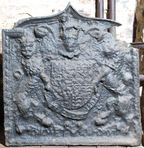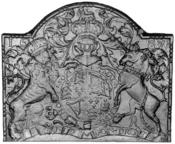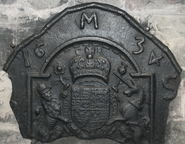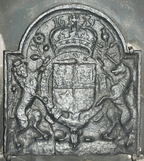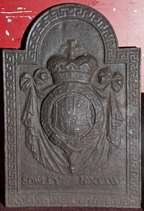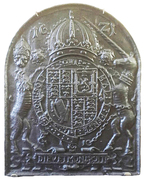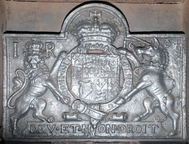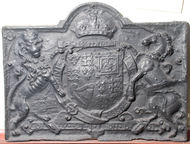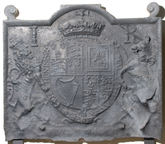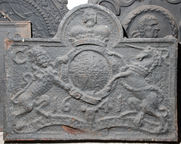-
74
Description: Rectangle with flattened ogee arch; ovolo, simulated rope edging; shield, garter, helm, mantling, crown and supporters (crowned lion and unicorn) of the English royal house of Stuart; motto across base
Notes: A variation of a type, dated 1618, noted at Burwash, Sussex.
Copies of this fireback are known.
Inscription: DIEU ET MON DROIT
Arms: English Stuart royal
- Decoration tags:
- rectangular with ogee-arch (shape)
- simulated rope (edging)
- whole carved pattern
- armorial
- text
Manufactured: in the early-17th century possibly in the Weald area of England.
Current location: in private hands, Groombridge, Kent, England.
- Attached to series:
- Stuart royal armorial firebacks
- Bristol armorial group
-
92
Description: Arched rectangular shaped; paternost bead edging (top and sides); Stuart royal arms: shield, garter, helm, crown, crest, supporters and motto; date split between top corners; initials split beneath supporters.
Notes: Firebacks with royal arms attributable to the reign of James II are, inevitably, uncommon owing to the brevity of his reign. Paternost beads are more usually found as edging on ‘Dutch’ types of fireback. A polychrome casting of this fireback is displayed as the royal arms in St James's church in North Cray, Kent. Copies of this fireback were advertised in Bratt Colbran Ltd.'s (London) catalogue in the early-20th century.
Copies of this fireback are known.
Inscription: 1687 /HONI SOIT QUI MAL Y PENSE / I R / DIEU ET MON DROIT
Arms: English Stuart royal (James II)
- Decoration tags:
- rectangular with round arch (shape)
- bead-and-pellett (edging)
- whole carved pattern
- individual numbers
- armorial
- royal
- text
Manufactured: in 1687 possibly in the Weald area of England.
Current location: Hampton Court, Richmond, Greater London, England.
Museum number: 1010 (part of the Royal Collection museum group)
Citation: Law, E., 1898, The History of Hampton Court Palace, vol 2 (London, George Bell & Sons), p. 256.
- Attached to series:
- James II royal armorial firebacks
- Stuart royal armorial firebacks
-
1076
Description: Fragment; arched rectangular fireback with embattled, cavetto-moulded edging; English Stuart royal shield, Garter, crown and supporters, stemmed rose and stemmed thistle, respectively, to left and right of crown; initials CR above crown; all within a plain border, with short lengths of twisted rope edging containing, at the top, the initial M between a split date; initials (only S surviving) below date.
Notes: A Carolean composite fireback. The armorial fireback includes stylistic elements - the form of the unicorn and of the harp - identical to those on two series of firebacks dated 1618 and 1619, indicating the work of the same pattern-maker; its width is 490mm.
Inscription: M / 1634 / [?] S / C R
Arms: English Stuart royal (Charles I)
- Decoration tags:
- rounded arched (shape)
- rope (edging)
- carved pattern panels
- composite
- individual letters
- individual numbers
- heraldic
- armorial
- text
Manufactured: in 1634 possibly in the Forest of Dean area of England.
Current location: Black and White House Museum, The Old House, High Town, Hereford, Herefordshire, England.
-
1075
Description: Arched rectangular shape; cavetto-moulded edging (top and sides); English Stuart Royal arms, garter, supporters, crown and motto; altered date above crown.
Notes: This design, which probably dates from 1619, has been used to cast composite firebacks with a variety of altered dates ranging from 1629 to 1662.
Copies of this fireback are known.
Inscription: 1639 [illegible Garter and royal mottoes]
Arms: English Stuart royal
- Decoration tags:
- rectangular with round arch (shape)
- cavetto (edging)
- whole carved pattern
- individual numbers
- heraldic
- armorial
- text
Manufactured: in 1639 in the Forest of Dean area of England.
Current location: Black and White House Museum, The Old House, High Town, Hereford, Herefordshire, England.
-
1108
Description: Arched rectangular shape; Greek Key border with fillet edges; in high relief, in front of swagged drapery, the shield of, quarterly, France quartering England, Scotland and Ireland, surrounded by a Garter, and surmounted by a ducal coronet; below, the inscription in capitals.
Notes: The use of the Greek Key design as a border is believed to be unique for an English fireback. Although somewhat indistinct, the use of the Stuart royal arms and the ducal coronet can be explained by the fact that the fireback was one of a group cast for the 2nd Duke of Richmond, whose father, the 1st duke, was the illegitimate son of Charles II and Louise de Kéroualle. The Richmond arms were differenced from the Stuart royal arms by the addition of a bordure compony (the detail of which is not distinct on this casting). Sowley Furnace, near Beaulieu in Hampshire, was owned in 1732 by John, 2nd Duke of Montagu, and was let to Miles Troughton. Similar, but larger, variants of this fireback are at Goodwood House, the seat of the Dukes of Richmond, where this fireback is likely to have once been. Criterion Auctions, Islington, 7 Jan 2019, lot 128 (£50).
Inscription: HONI SOIT QUI MAL Y PENSE / SOWLEY MDCCXXXII
Arms: Duke of Richmond
- Decoration tags:
- rectangular with round arch (shape)
- fillet (edging)
- carved pattern panels
- heraldic
- armorial
- royal
- text
Manufactured: in 1732 at Sowley Furnace, Beaulieu in the New Forest area of England.
Current location: not known.
-
994
Description: Arched; cavetto-moulded edging; English royal Stuart shield, garter, crown, supporters, and motto on a cartouche; a monogram of S and C lies to the left of the Garter buckle; a small rose stamp is repeated each side of crown; date split each side of top of crown.
Notes: Although English arms, the design is in a continental style, arched firebacks being typical of Lorraine. In some later recastings the proportions have been distorted, making them narrower, and the '16' of the date is missing. The fireback illustrated was formerly in the city museum of Vlissingen in the Netherlands.
Copies of this fireback are known.
Inscription: 16 21 / HONI SOIT QVI MAL I PENSE / SC / DIEV ET MON DROIT
Arms: English Stuart royal (James I)
- Decoration tags:
- rounded arched (shape)
- cavetto (edging)
- whole carved pattern
- heraldic
- monogram
- armorial
- royal
- text
Manufactured: in 1621 possibly in the Ardennes area of Belgium.
Current location: not known.
Citation: Gardner, J. S., 1898, 'Iron Casting in the Weald', Archaeologia, 56, 1, pp. 133-164.
- Attached to series:
- Jacobean royal armorial firebacks
- Stuart royal armorial firebacks
-
360
Description: Arched rectangular shape; ovolo edging; Stuart royal arms of England (quarterly, 1st and 4th, France and England, 2nd Scotland and 3rd Ireland) with garter, crown, motto and supporters; initials either side of lion’s head; date either side of unicorn’s head.
Notes: The slightly awkward positioning of the date suggests it was added later. Copies were advertised in the Carron Company's catalogue.
Copies of this fireback are known.
Inscription: I R [Iacobus Rex] 16 04 / DEV ET MON DROIT
Arms: English Stuart royal - James I
- Decoration tags:
- rectangular with round arch (shape)
- cavetto (edging)
- whole carved pattern
- individual numbers
- armorial
- royal
- text
Manufactured: in 1604 possibly in the Weald area of England.
Current location: Scotney Castle, Lamberhurst, Kent, England.
Museum number: 791456 (part of the National Trust museum group)
- Attached to series:
- Jacobean royal armorial firebacks
- Stuart royal armorial firebacks
-
405
Description: Arched rectangular shape with small rhomboidal flanges in the corners of the arch; cavetto moulded edge on all sides; Stuart royal arms (1605-88, 1702-14) with lion and unicorn supporters, garter, crown and motto; raised inscription in a tapering label beneath crown.
Notes: An amended copy of a 17th/early 18th century original (see no. 633). The added inscription has been impressed with the personalised cast handle of a cooking vessel. A bronze skillet bearing the inscription 'STANDEN 1726' on its handle has been recorded elsewhere, but the impression on the fireback has been formed from a handle with the inscription inset in relief, whereas the 1726 inscription is inscribed. Also the lettering on the handle used to personalise the fireback, which includes the letter A surmounted with a horizontal line, is of an earlier style. Three members of the Standen family, Thomas, James and Elias, were founders at Beech or Robertsbridge furnaces, Sussex, 1728-9, and a John Standen was casting skillets at Heathfield Furnace in the early 1730s; each could have been the founder of the 1726 skillet, but the maker of the handle used in the fireback casting may have been earlier. Formerly at Marshalls Manor House, Maresfield, Sussex.
Inscription: IAMES STANDEN [+Garter and royal mottoes]
Arms: English Stuart royal
- Decoration tags:
- rectangular with round arch (shape)
- cavetto (edging)
- carved pattern panels
- whole carved pattern
- armorial
- royal
- text
Manufactured: in the late-17th to early-18th century in the Weald area of England.
Current location: Anne of Cleves House, Southover High Street, Lewes, East Sussex, England.
Museum number: LH000.943 (part of the Sussex Archaeological Society museum group)
Citation: Dawson, C., 1903, 'Sussex Iron Work and Pottery', Sussex Archaeological Collections, 46, pp. 1-54.
- Attached to series:
- Stuart royal armorial firebacks
- Miscellaneous stamp firebacks
-
406
Description: Arched rectangular shaped; convex moulding (top and sides surviving); scrolled protrusions above top corners; Stuart royal shield, crown, garter, supporters and motto; initials separated by crown.
Notes: The scrolled protrusions suggest a possible association with other firebacks with similar features. The Stuart arms in the same style are seen on another fireback (no. 1036).
Inscription: I R / HONI SOIT QVI MAL Y PENSE
Arms: English Stuart royal - James I
- Decoration tags:
- rectangular with round arch (shape)
- convex (edging)
- whole carved pattern
- armorial
- royal
- text
Manufactured: in the early-17th century possibly in the Weald area of England.
Current location: Anne of Cleves House, Southover High Street, Lewes, East Sussex, England.
Museum number: LH000.944 (part of the Sussex Archaeological Society museum group)
-
445
Description: Arched rectangular shape; cavetto moulded edging; garter enclosing Stuart royal arms, with supporters, crown and motto; date split either side of garter buckle.
Notes: The style of the numerals is very similar to those on a plate bearing a lion, dated 1656, and is likely to be the work of the same pattern-maker; a variant (no. 253) has a substituted date of 1664.
Inscription: C R / 16 41
Arms: English Stuart royal
- Decoration tags:
- rectangular with round arch (shape)
- cavetto (edging)
- whole carved pattern
- armorial
- royal
- text
Manufactured: in 1641 in the Weald area of England.
Current location: Anne of Cleves House, Southover High Street, Lewes, East Sussex, England.
(part of the Sussex Archaeological Society museum group)
- Attached to series:
- Carolean royal armorial firebacks
- Stuart royal armorial firebacks
- Royalist series
